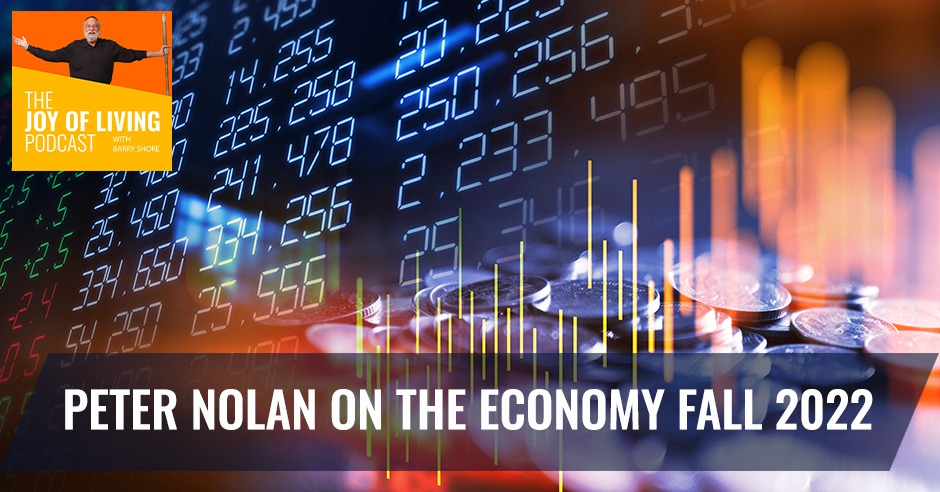Share This Episode

Peter Nolan on the Economy Fall 2022
U.S. economic growth 2022
It’s quite rare for us to have the same guest multiple times, but because of the request of hundreds and thousands of our listeners, we decided to have our wonderful guest again: Peter Nolan. Last time he shared three predictions about the fall of the economy and they all came true. Today he’s going to even more. Today he’s going to talk about some more important topics such as pain, national debt and pandemic. What can we expect from the economy in the near future? Economic forecast for next 5 years What are some of the biggest concerns that he has? He also talks about inflation and its impact on the economy and economic outlook 2022. Listen to the interview to find out more about what Peter Nolan has to say about the current state of economy and what we can expect in the future. We hope that this episode will bring new lights to some of the things that you may have been worried about. So ready?
Listen Here (click here to watch episode)
Show Notes:
[10.1] Three predictions Peter Nolan made which came true
- He used the P word when we were together last time.
- He said in the coming months there would be great pain.
- He also used another word which is R word
- R word stands for recession.
- He said recession is looming and it’s over the edge.
- He also said people have their heads up someplace where it doesn’t allow you to become aware.
[13.45] What do you see in terms of pain for the regular person, the businessperson, and for the economy in general
- The way I see things now is I don’t see an easy path out of the mess
- If you see what happened for many things
- First, aggressive stimulus by the Federal Reserve who kept rates artificially low during the pandemic.
- You've the government basically throwing buckets of money out to people during the pandemic.
- As a result of that you’ve too many dollars chasing too few goods
- And as a result, the price of almost everything went up.
- And we had inflation.
[15.32] Inflation
- Today the inflation is running somewhere between eight plus percent.
- That’s a government official calculation of inflation and for the consumers that’s a lot more.
- We also have wage growth, but the inflation is higher than the wage growth.
- You can fabricate economic growth out of thin air.
- You can hand people more money by printing a currency.
- You can borrow and give.
- But eventually you'll have to pay the price.
- There’s a Wall Street’s saying: “Selling May and Go Away”
- Meaning. Sell your holdings in May and go on vacation and don’t worry about it.
- And figure it out right around now.
- But I see continued pain and no easy way out.
[18.52] Real Estate
- If you look at real estate. Mortgage rate for the average family on a 30-year fixed mortgage was 6.85.
- One year ago, it was half that. It was less than half that.
- What does that increase is that radically decreases their purchasing power.
- You’ll then need to assume that real estate values need to fall.
- If you look closely our most expensive purchase is a house and then car.
- And that’s where I honestly don’t see any easy way out.
[25.06] The concept of debt. A large national debt. How does it affect a business owner?
- When you talk about the national debt, it’s hard to comprehend.
- Because of how the political system works, no one gets reelected fixing the national debt problems.
- We pay a price for it and that’s reflected in the interest rates.
- Listeners, please read the editorial article on the Wall Street Journal: “Doom Loop.”
- Businesses have been able to borrow at extraordinarily low rates and a lot of that is not fixed.
- Now, out of the sudden, money that must go out of the business to serve as debt is increasing.
- And that impacts the business.
- And at the same time, you’ve softened consumer demands.
- Businesses are no different than consumers as their costs go up and their spending goes down.
[36.47] War means increase in pricing
- Russians think that USA did it
- It's an extraordinarily very troubling time.
- My belief is probably nothing is going to happen.
- But when you look at history, you stumble into the war.
- It’s rare that people wake up and say let’s go to war but it’s a series of reactions to unintended consequences.
- And that’s where I’m very concerned.
- On the other hand, when I talk to people in the financial world, they say there’s still quite a bit of liquidity on the sidelines.
- Which means the market can react and people can jump in if prices get low enough.
[45.09] Opportunity
- Let me add one thing that people never talk about.
- The one thing that the United States has which most other countries don’t.
- Do they have enshrined protections of property rights?
- We have this brilliant judicial system, and we have constitutions.
- In other countries, it’s like well you made a lot of money so we’re going to just take some arbitrarily.
- So, in 2019 the interest rates were low, and the stock market was low, so it was a pretty good time.
- And today the violins aren’t playing the way they were in 2019.
- And of course, we went through covet.
- What you’ll see is the situations where there’s acute imbalances in the marketplace.
- You’ve to have the holding power and be willing to suffer short-term losses.
Insider Tips:
Important Links:
About Peter Nolan
Peter Nolan founded Nolan Capital, Inc. in 2014 as the holding company for his family office to make long term investments in growth oriented companies.
Prior to founding Nolan Capital, Inc., Peter joined Leonard Green & Partners (“LGP”) as Managing Partner in 1997 along with Jon Sokoloff and John Danhakl. Under their leadership, the firm completed approximately 100 principal investments and grew Assets Under Management from $500 million in 1997 to over $38 billion today. In 2019, Leonard Green raised approximately $15 billion for its most recent funds. Peter transitioned to his current role as Senior Advisor to Leonard Green & Partners in 2014.
[bctt tweet="Learn to disassociate the thoughts you have from who you are." username="ambassador4joy"]
THIS SHOW BROUGHT TO YOU BY ORGANIFI
use code LIVING for 20% off your next order

